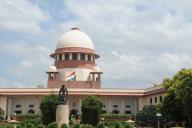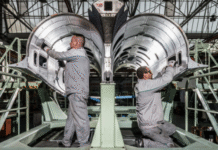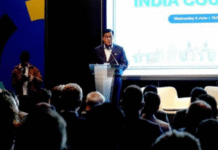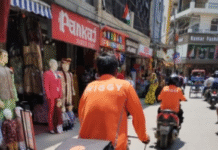New Delhi– A nine judge constitution bench of the Supreme Court bench will hear from Tuesday a batch of petitions by some top corporate houses and business associations challenging the imposition of entry tax by the various state governments, contending that it was violative of the freedom of trade and commerce provided under the Constitution.
 The bench of Chief Justice T.S.Thakur, Justice A.K.Sikri, Justice S.A. Bobde, Justice Shiva Kirti Singh, Justice N.V. Ramana, Justice R. Banumathi, Justice A.M. Khanwilkar, Justice D.Y. Chandrachud and Justice Ashok Bhushan will examine whether entry tax being imposed by the various states was in breach of Article 301 providing for freedom of trade, commerce and intercourse within the country.
The bench of Chief Justice T.S.Thakur, Justice A.K.Sikri, Justice S.A. Bobde, Justice Shiva Kirti Singh, Justice N.V. Ramana, Justice R. Banumathi, Justice A.M. Khanwilkar, Justice D.Y. Chandrachud and Justice Ashok Bhushan will examine whether entry tax being imposed by the various states was in breach of Article 301 providing for freedom of trade, commerce and intercourse within the country.
The top court is seized of about 2,000 petitions by manufacturers and their associations who have challenged the constitutional validity of entry tax laws enacted by the different States.
The entire issue of entry tax that is under challenge through these petitions involve financial implications of about Rs 30,000 crore – a huge sum for the cash-strapped states like Odisha which would be getting something like Rs 1,600 crore from the tax.
The top court was first moved by Jindal Stainless Ltd. way back in 2002 when the company had challenged the validity of the Haryana Local Area Development Tax Act, 2000.
It had challenged the validity of act on the grounds that it was violative of Article 301 since it imposed restrictions on trade and is not protected by Article 304.
Secondly Jindal Stainless Ltd had contended that the enactment of the law that levies sales tax on inter-state sales was beyond the competence of the state legislature.
Article 304(b), Jindals said, provides that no law for the imposing reasonable restrictions on the freedom of trade in public interest would be brought before the state assembly without prior sanction of the President.
The first order on the plea was passed on September 26, 2003, and had referred the matter to a larger bench of five judges.
The five judge constitution bench on April 13, 2006, after examining the whole gamut of issues including previous judgments, directed hearing of petitions challenging the constitutional validity of the various state laws on entry tax on goods travelling from one state to another.
On December 18, 2008 a two judges bench framed 10 questions for consideration by the larger bench and the crucial question was “whether the state enactments relating to levy of entry tax have to be tested with reference to both Article 304(a) and Article 304(b) of the Constitution and whether Article 304(a) is conjunctive with or separate from Article 304(b)?”
Addressing the questions, the five judges bench felt that the April 9, 1962 judgment of the seven judge bench on entry tax and related issues needs to be revisited as certain doubts were expressed about it.
Referring the matter to still larger nine judges bench by their order of April 16, 2010, the bench framed several questions including the balancing of freedom of trade and commerce in Article 301 vis-a-vis the States’ authority to levy taxes under article 245 and Article 246 of the Constitution, as well as if taxation is justiciable and on the inter-relationship between Article 19(1)(g) (Right to practice any profession, or to carry on any occupation, trade or business) and Article 301. (IANS)






